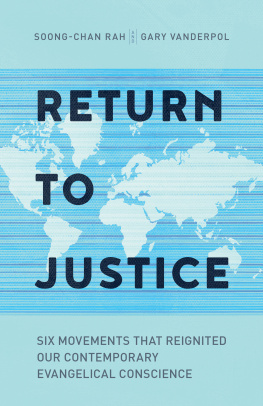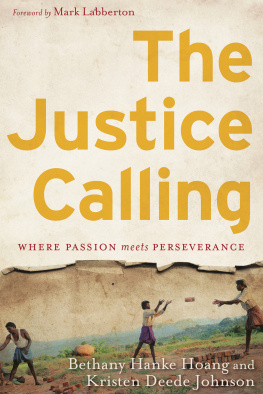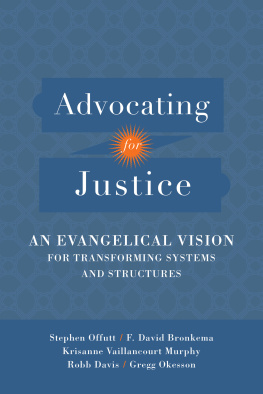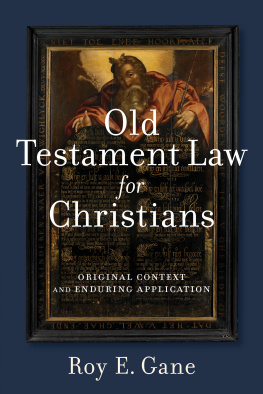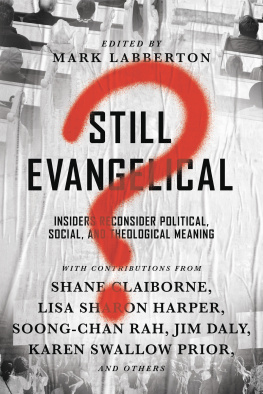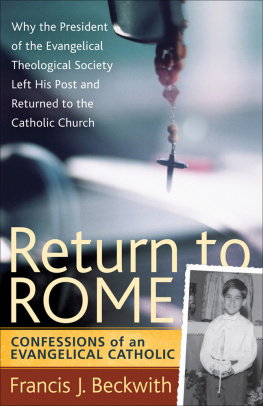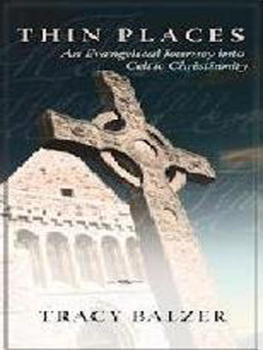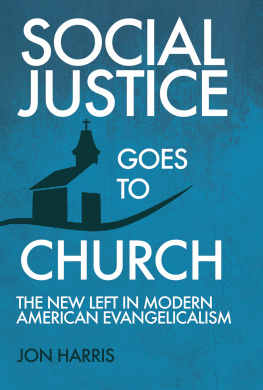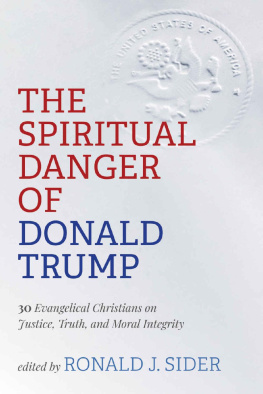Copyright Page
2016 by Soong-Chan Rah and Gary VanderPol
Published by Brazos Press
a division of Baker Publishing Group
P.O. Box 6287, Grand Rapids, MI 49516-6287
www.brazospress.com
Ebook edition created 2016
All rights reserved. No part of this publication may be reproduced, stored in a retrieval system, or transmitted in any form or by any meansfor example, electronic, photocopy, recordingwithout the prior written permission of the publisher. The only exception is brief quotations in printed reviews.
Library of Congress Cataloging-in-Publication Data is on file at the Library of Congress, Washington, DC.
ISBN 978-1-4934-0451-3
Unless otherwise indicated, Scripture quotations are from the Holy Bible, New International Version. NIV. Copyright 1973, 1978, 1984, 2011 by Biblica, Inc. Used by permission of Zondervan. All rights reserved worldwide. www.zondervan.com
Portions of the section From Jerusalem to Babylon in chapter 1 are taken from Soong-Chan Rah, Prophetic Lament (Downers Grove, IL: InterVarsity, 2015), 3543, 8688; and Soong-Chan Rah, The Sin of Racism, in The Image of God in an Image Driven Age: Explorations in Theological Anthropology , edited by Beth Felker Jones and Jeffrey W. Barbeau. Copyright 2016 by Beth Felker Jones and Jeffrey W. Barbeau. Used by permission of InterVarsity Press, P.O. Box 1400, Downers Grove, IL 60515, USA. www.ivpress.com
An earlier version of some portions of chapter 4 appears in Soong-Chan Rah, Salt, Light, and Social Change, Sojourners (November 2011): 2024. Reprinted with permission from Sojourners, (800) 714-7474, www.sojo.net.
Portions of chapter 5 are taken from Soong-Chan Rah, The Sin of Racism, in The Image of God in an Image Driven Age: Explorations in Theological Anthropology , edited by Beth Felker Jones and Jeffrey W. Barbeau. Copyright 2016 by Beth Felker Jones and Jeffrey W. Barbeau. Used by permission of InterVarsity Press, P.O. Box 1400, Downers Grove, IL 60515, USA. www.ivpress.com
The section under The Formation of the National Black Evangelical Association in chapter 5 uses material previously published in Soong-Chan Rah, Prophetic Voices and Evangelical Seminary Education, Common Ground Journal 8, no. 1 (Fall 2010): 3248.
A portion of chapter 6 is adapted from Gary VanderPol, World Vision, in Religious Leadership: A Reference Handbook , edited by Sharon Henderson Callahan (Thousand Oaks, CA: SAGE Publications, 2013), 494.
Endorsements
While other recent books on current-day prophetic evangelicalism have focused on individuals, Return to Justice surveys the historical institutional foundations of todays prophetic movement. With sharp discernment and clarity, Rah and VanderPol offer the church an invaluable giftperspective. They show us the decades-long journey and profound influence of evangelical institutions and communities toward justice in modern times. By looking back these authors offer a kind of ecclesial compass for future generationswisdom for the road to justice laid out before us all.
Lisa Sharon Harper , chief church engagement officer, Sojourners
As the social concern among evangelicals grows, it behooves them not only to look at present needs and plan for the future, but also to revisit the stories of pioneers and trailblazers. Return to Justice provides a well-documented historical orientation for an engaged twenty-first-century evangelicalism. In this fascinating narrative we find inspiration, constructive lessons, and pointed challenges for embodying compassion and doing justice. Rah and VanderPol teach us that looking back offers needed perspective for moving forward.
M. Daniel Carroll R. ( Rodas) , Wheaton College
This is an outstanding primer on the resurgence of evangelical biblical justice activism over the past several decades. Its six historical snapshots of this surge, when viewed together, offer just the right kind of historical background to the present-day interest of Gen-X and Millennial evangelicals, especially, in ministry to the poor, marginalized, and oppressed. I pray that it will inspire even more evangelicals to walk the way of Jesus and spend themselves for those in need.
Douglas A. Sweeney , Trinity Evangelical Divinity School
Justice has always been an essential part of the proclamation of the gospel. The early followers of Jesus stood out in their communities because they were the ones rescuing discarded female infants from the dung heap. They not only preached the gospel, they were the gospel. Rah and VanderPol have demonstrated that a lived gospel has also been essential to the evangelical movement. If you care about the gospel of Jesus, then you should drink deeply from Return to Justice . It is the gospel.
Frank A. James III , Biblical Theological Seminary/Philadelphia
The story of evangelicalism in the United States, and specifically the exciting story of how many in the modern evangelical movement have increasingly embraced justice concerns in the postWorld War II era, is inspiringbut also complex and underappreciated. In Return to Justice , Rah and VanderPol have done a masterful job, telling six compelling stories, with scholarly rigor and highly accessible prose, of evangelicals rediscovering their nineteenth-century justice heritage. Calling the church to return to its true vocation and embrace biblical justice has been the central motivating force of my own life and vocation. So I cannot recommend this book strongly enough. Return to Justice should be read by anyone who wants to understand evangelicals and Christianity on a much deeper level than the shallow political definitions in the media.
Jim Wallis , New York Times bestselling author of Americas Original Sin: Racism, White Privilege, and the Bridge to a New America ; president of Sojourners; editor-in-chief of Sojourners magazine
In the lifetime I have spent within the circle called evangelicalism the single-most noteworthy development is not the much-discussed shift toward activism among the political Right in the Reagan years, but rather the much deeper stream flowing now with dramatic force into social justice activism on the part of many evangelicals. The resurgence of concern for justice emerges from deep wells in the evangelical tradition, and the story needs to be toldand in fact has now been told in Return to Justice . While this story reveals some unexamined assumptions or activisms, the commitment to justice in all its formssome central and some sadly neglectedis inherent to the deep evangelical tradition. Many who write the history of the twentieth century have ignored these deep wells but they are now visible for all to see.
Scot McKnight , Northern Seminary
Dedication
Dedicated to our mutual church community
at Cambridge Community Fellowship Church.
To my son, Elijah.
May these examples inspire you to see
the work of God in your own life.
SCR
To my mother,
who has always known just how to listen.
GVP
Contents
Cover
Title Page
Copyright Page
Endorsements
Dedication
Acknowledgments
Introduction
Part 1: Justice Is Personal and Relational
1. The Power of Personal Story: John Perkins and the Christian Community Development Association
2. The Power of a Personal Connection: Child Sponsorship and Global Poverty
Part 2: Justice Is Public and Prophetic
3. World Vision and the Work of Prophetic Advocacy
4. Sojourners as a Prophetic Voice for Those on the Margins
Part 3: Justice Confronts Power in Community
5. African-American Evangelicals and the Challenge of True Racial Reconciliation
Conclusion
Bibliography
Notes
Index

